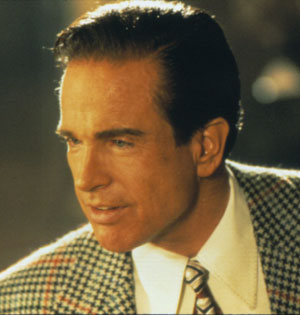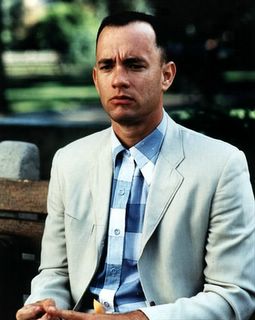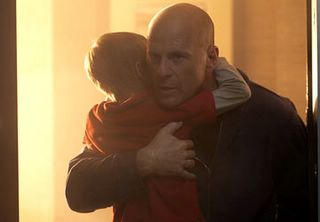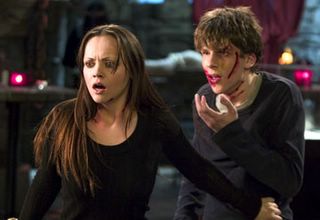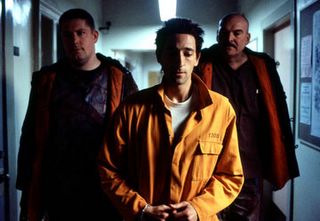High Roller: The Stu Ungar Story
Goddammit, why do all poker movies have to suck? Seriously. It's an interesting game. It's inherently dramatic. Poker rooms around the country are genuinely filled with funny, interesting characters. I mean, what could be more intense than gambling? It's conflict in its most pure form - two players, only one winner.
And yet the movies about poker just don't ever get it right. They never seem to trust the game itself to maintain viewer interest. The movie is always over-directed, over-explained or distracting, because the filmmakers want to include everyone, even people who don't care about poker. But fuck that - you want to make a poker movie, make a movie about people who play poker, not the same old tired "fall from grace" bullshit but set in a casino.
High Roller: The Stu Ungar Story tells, yes, the true story of three-time World Series of Poker champion Stu Ungar, who died at 45 in a motel room following years of drug abuse, alcoholism and degenerate gambling. This is an interesting story. Ungar was something of a child prodigy at cards, and yet his success was undermined for his entire life by his outrageous gambling addiction. He would lose up to $100,000 in a single day on football. He would lose $1000 on a stupid double-or-nothing bet after a night of winning at gin rummy. He would repeatedly blow thousands on games he knew nothing about, when he was virtually guaranteed to win if only he stuck to cards.
So why doesn't writer-director A.W. Vidmer allow the story to unfold naturally? He needlessly complicates the film, mainly by adding a ridiculous, corny "bookend" featuring Stu (Michael Imperioli) narrating his life story to a disembodied Grim Reaper figure (for real). It's embarrassing. I'm thinking Vidmer decided to make a poker film more because it's, like, totally hot right now, rather than any appreciation for the game.
Stu was a real guy, but that doesn't stop Vidmer from retelling his story in a thoroughly formulaic, trite fashion. I mean, first of all, there's that "narration from beyond the grave" bullshit, which made me want to shut the movie off in the first 10 minutes.
But then, we get 20 minutes (!) of material featuring Stu as a kid, dealing with his overly-strict Jewish dad and a local gangster (Michael Nouri) who takes the boy under his wing. This stuff essentially riffs on the same ideas as in Goodfellas, and the casting later of Imperioli (himself a 'Fellas vet) and Steve Schrippa, Mike's "Sopranos" co-star, as his friend Anthony kind of cements the entire idea.
Basically, Stu is a total shit. He loves his wife Angela (Renee Faia) but he also likes to blow thousands at the track, fuck strippers and do lots of blow. He can win almost any time he sits down at the card table, but still loses it all on sports gambling, at the racetrack or on stupid side pots. And even on the rare occasions that he's sober, he's self-involved, whiny, manipulative and lacking in any sort of real personality.
But, a movie about a total shit, I could deal with. I like Owning Mahoney a good deal, and that's about a pathetic gambling addict who screws over everyone in his life (and embezzled hundreds of thousands of dollars from the bank where he works). But Mahoney in that film is kind of fascinating. He seems to thrive on losing, and as he digs himself a deeper and deeper hole, it's terrific to watch the brilliant slow-burn performance of star Phillip Seymour Hoffman.
I don't know if Imperioli is capable of that sort of performance, because High Roller never even gives him the chance. It's much more straight-forward. Brilliant guy wins at cards. Receives admiration. Messes up repeatedly. Loses everything. Dies penniless and alone. Message: gambling's bad, wife and kids rule.
Sigh...I'm sure this guy's life had some left turns in it, took some unexpected twists. That's what the game of poker itself is all about - you think you have it figured out, but you don't until everyone turns over his/her cards. I had High Roller figured out in ten minutes flat.
Oh, and it looks cheap, a lot of the supporting actors suck (particularly the kid playing the Young Stu...sorry, little guy...).
And one more thing we've got to talk about. The constant, atrocious musical montages. There are no less than 10 musical montages in the film. Every change in Stu's life is set to some really loud, horribly obnoxious, cheesedick country song. For real. So, it's like, Stu making a big wager in a poker tournament with Big & Rich wailing about cowboys in the background. Then (for real!), Stu shopping for meat while some chick wails about how her man done left her. It's absolutely atrocious. How about you write a concise scene that expresses a goddamn idea, Vidmer, instead of hoping that country music radio will do your exposition for you, jackass.
Next!


